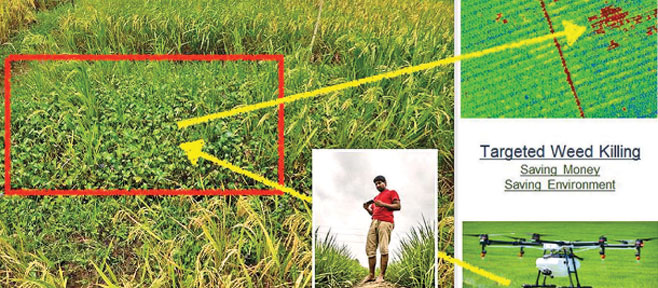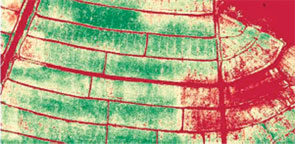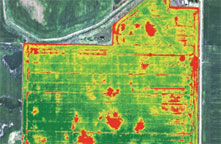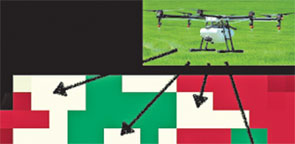CIC: Drones enable precision targeting of fertiliser, agro-chemicals
Smart farming:
CIC Holdings PLC (CIC) has begun flying drones to scan fields and
distribute agro chemicals and fertilizer with minimum human involvement
and wastage, using its own data sets from years of crop research.
|

Identifying nutrition level of the soil |
"With this project we hope to reduce the misuse of agro chemicals
(pesticides and fertilizer) while reducing the human exposure to agro
chemicals in Sri Lanka," Managing Director, CIC Holdings, Samantha
Ranatunga said.
"CIC has been a pioneer in agriculture and research and this is a
result of that effort. This method will also help to reduce the excess
amount of agro chemicals and fertilizer released to the environment," he
said.
This is the first time in the world that areas are being identified
and automatically treated using the drone and GPS satellite positioning
technology, the company said in a statement.
Manju Gunawardene, one of Sri Lanka's most recognized innovators, has
been working on the project with CIC Holdings for the past 7 years.
"The country needs productivity increase in the agriculture sector to
meet increasing food demand, to enhance farmer profitability as well as
to optimize utilization of resources such as land, water, fertilizer to
make the whole system more sustainable," Gunawardene said. "As a
stepping stone in that direction, we thought of introducing this
solution. The normal agro practice is that you observe and measure and
finally respond to it which is time consuming, destructive to the field
and has a high variability due to different perceptions of people," he
said.
|

Pelwehera CIC farm - aerial view |
|

Aerial view of the farm using NDVI Technology |
|

Targeted weed killing |
Gunawardene has won three gold medals and a silver medal at the
Innovators Competition in Geneva, Switzerland. He started his career in
1990 by winning the National Inventors title and won the title again in
2012. He works as a consultant to CIC Precision Agriculture and runs his
own research firm in India - he is Inventor, Senior Research Scientist
and CEO at Hybrid Technologies.
CIC, a conglomerate with a business portfolio extending into Agri
Produce, Health and Personal Care, Livestock Solutions, Industrial
Solutions and Crop Solutions, said it will be offering this new
technology as a service to farming communities.
"Unlike other countries we can't use fixed wing aircraft to
distribute fertilizer as you need thousands of acres to do so,"
Gunawardene said. "We have small land masses - therefore, it's more
practical to use drones. We will be operating the drones within the
civil aviation regulations of Sri Lanka."
"Drones are not the heart of this project, the data set we have
gathered with CIC is the heart of this entire solution. The company's
research and development team has used studies and research on varies
types of crops, growth and deficiency data for the past seven years to
introduce this solution."
Gunawardene outlined the new three-step process used by CIC. The
first is observation.
"The drone will fly over the field and collect data. This gives the
farmer a different perspective of the field. Colour differences,
variations and gaps where there is room for cultivation are not visible
when you observe the field from ground level. Capturing the entire
picture of the field from a higher perspective helps determine the first
level of remedial action and engagement." Drone technology is also used
for measurement.
The use of multi spectral cameras, special sensors and advanced
software systems helps to differentiate healthy and unhealthy crops, the
size of plants and especially detect infections, temperature of the soil
and detect plant diseases, pest attacks and weeds using the NDVI
Technology (Normalized Difference Vegetation Index).
"The most important part of the technology is the ability to run a
check on the nutrition level of the soil. The captured data can be used
as a yield prediction tool as well," the CIC statement said.
The third step is to respond. "The problem with the current manual
practice is the use of resources such as water, manure, and pesticides
in a haphazard manner," Gunawardene said. "There is high wastage, high
human exposure, it is high cost and it is destructive as it leads to
resource depletion and pollutes the environment.
"As the first step of reducing these effects, our automated drones
will reduce human exposure and the amount of fertilizer and agro
chemicals used.
The drones will only deploy the required amount of fertilizer to the
areas with nutrient deficiencies and the agro chemicals only to areas
affected with weeds using maps and captured data. These drones are also
equipped with special instruments to repel wild elephants," Gunawardene
said.
"Precision Agriculture helps to cut down all the drawbacks of the
manual practice as it's extremely fast, low variability, low cost and
most importantly it's non-destructive to the field.
The main objective at this juncture is to reduce inputs thereby
ensuring a better harvest with use of 'Precision Agriculture Practices'
or 'Smart farming'." |

